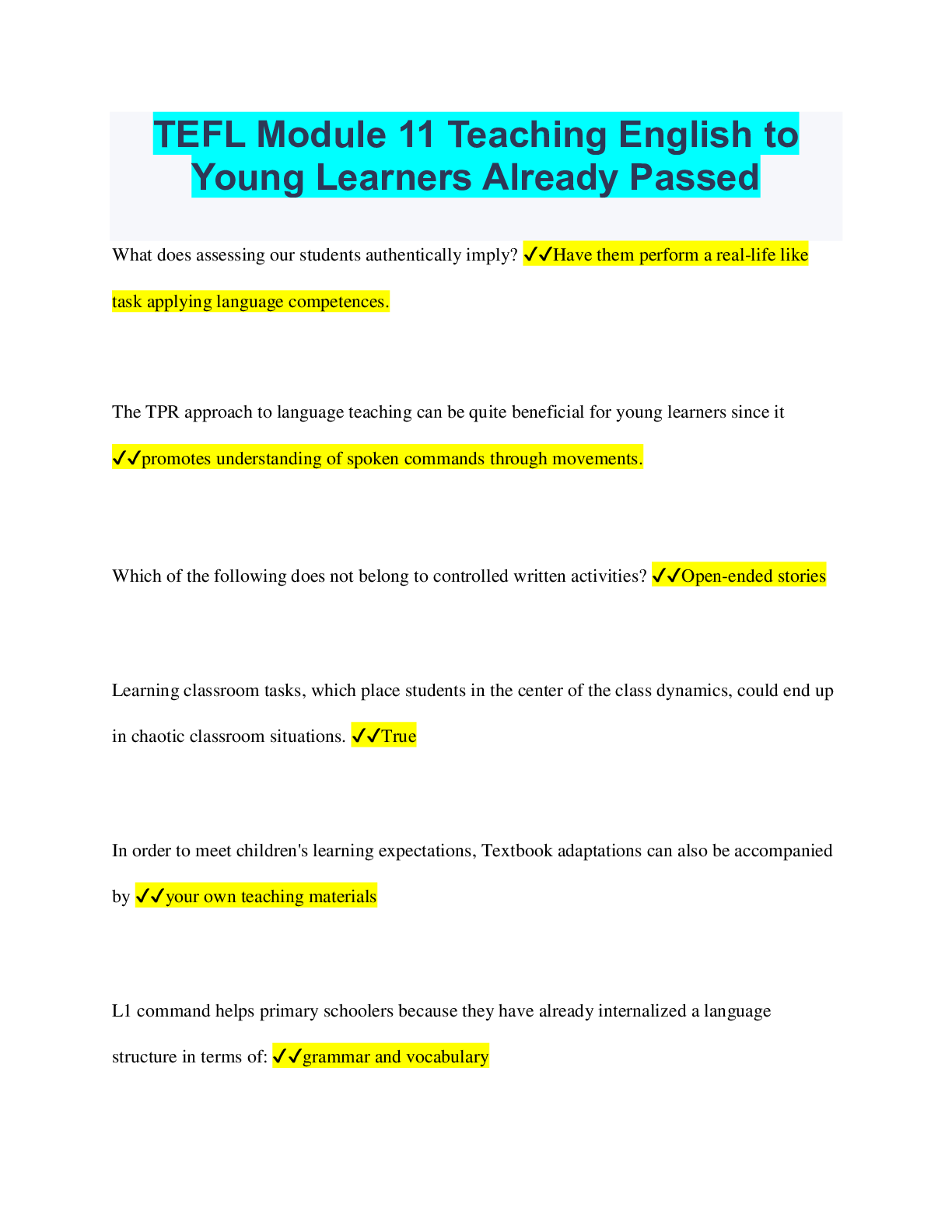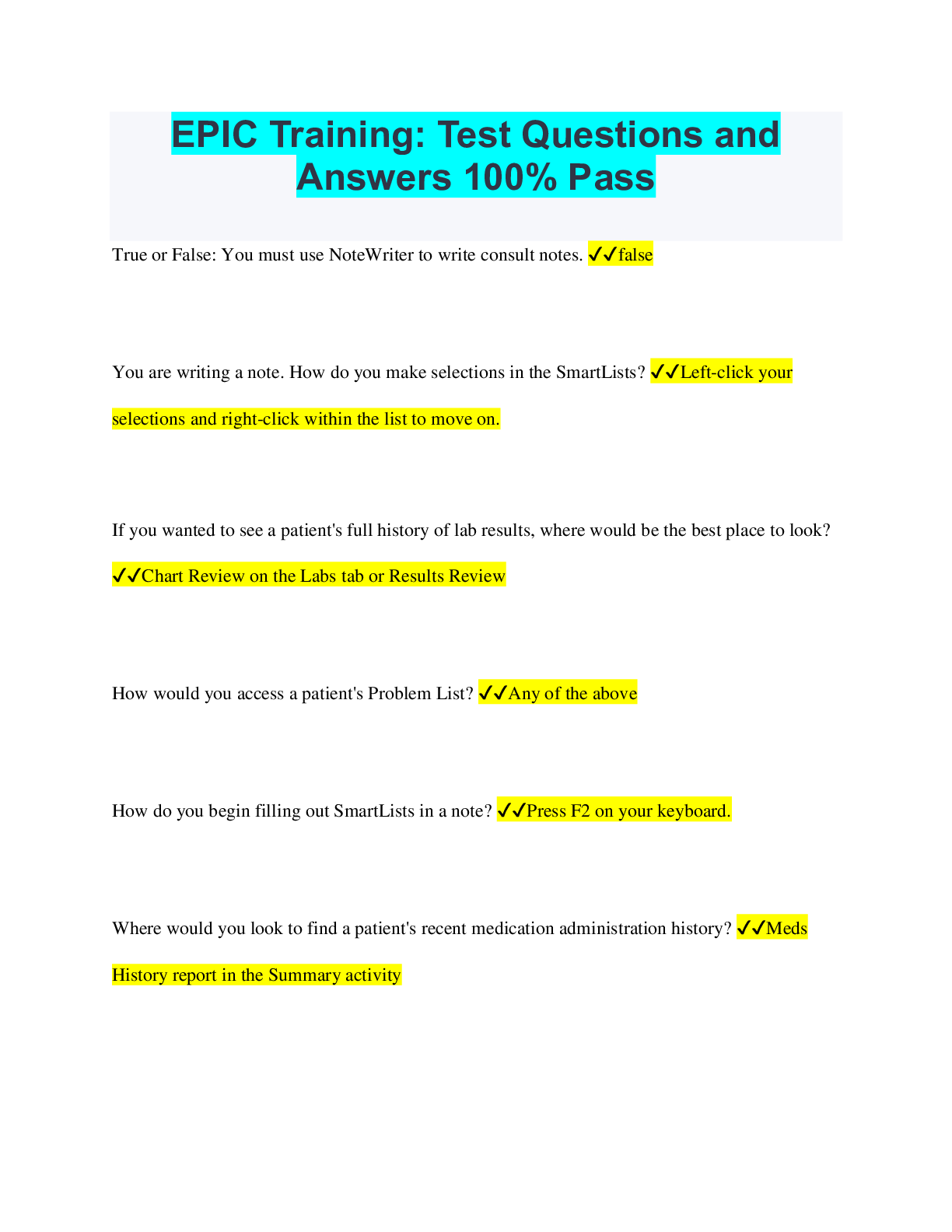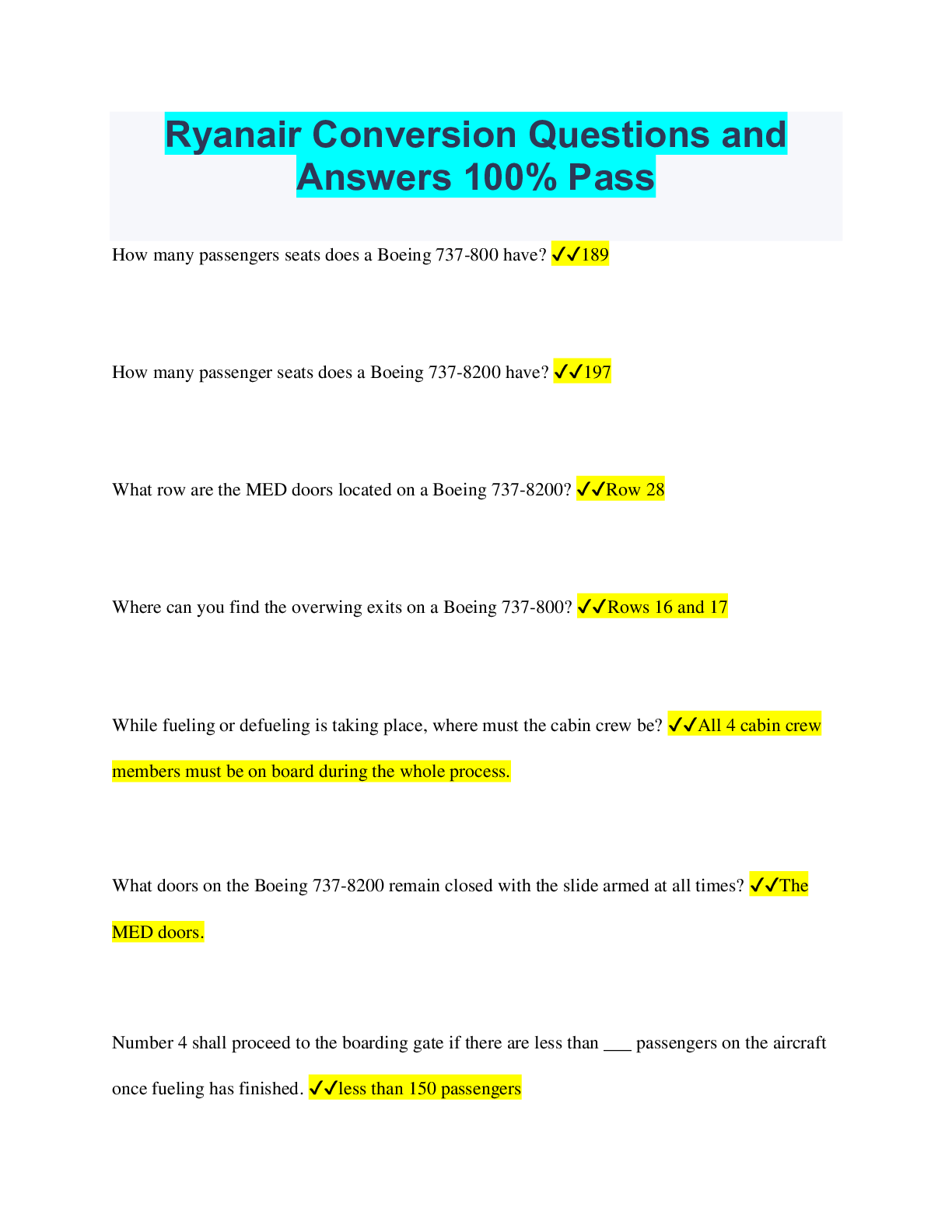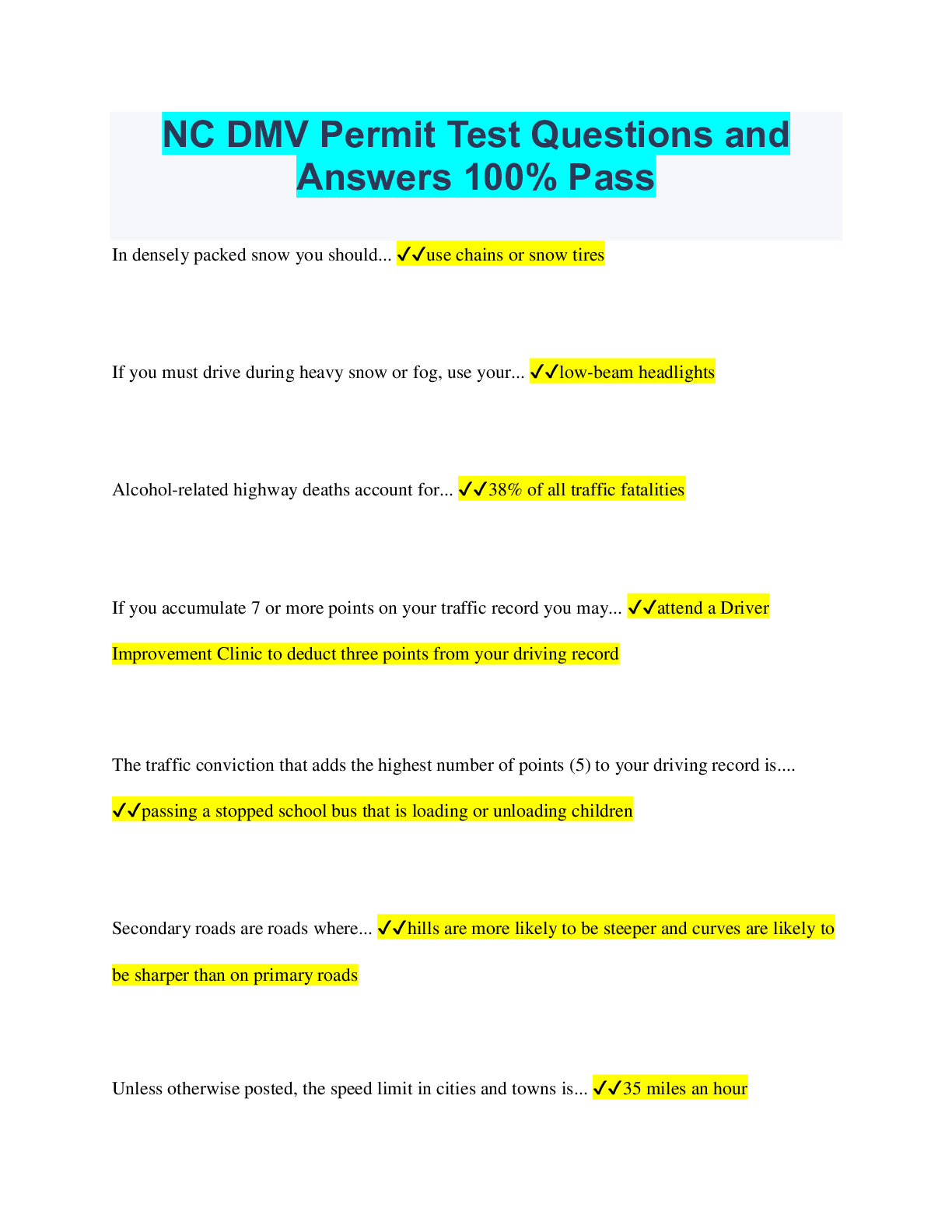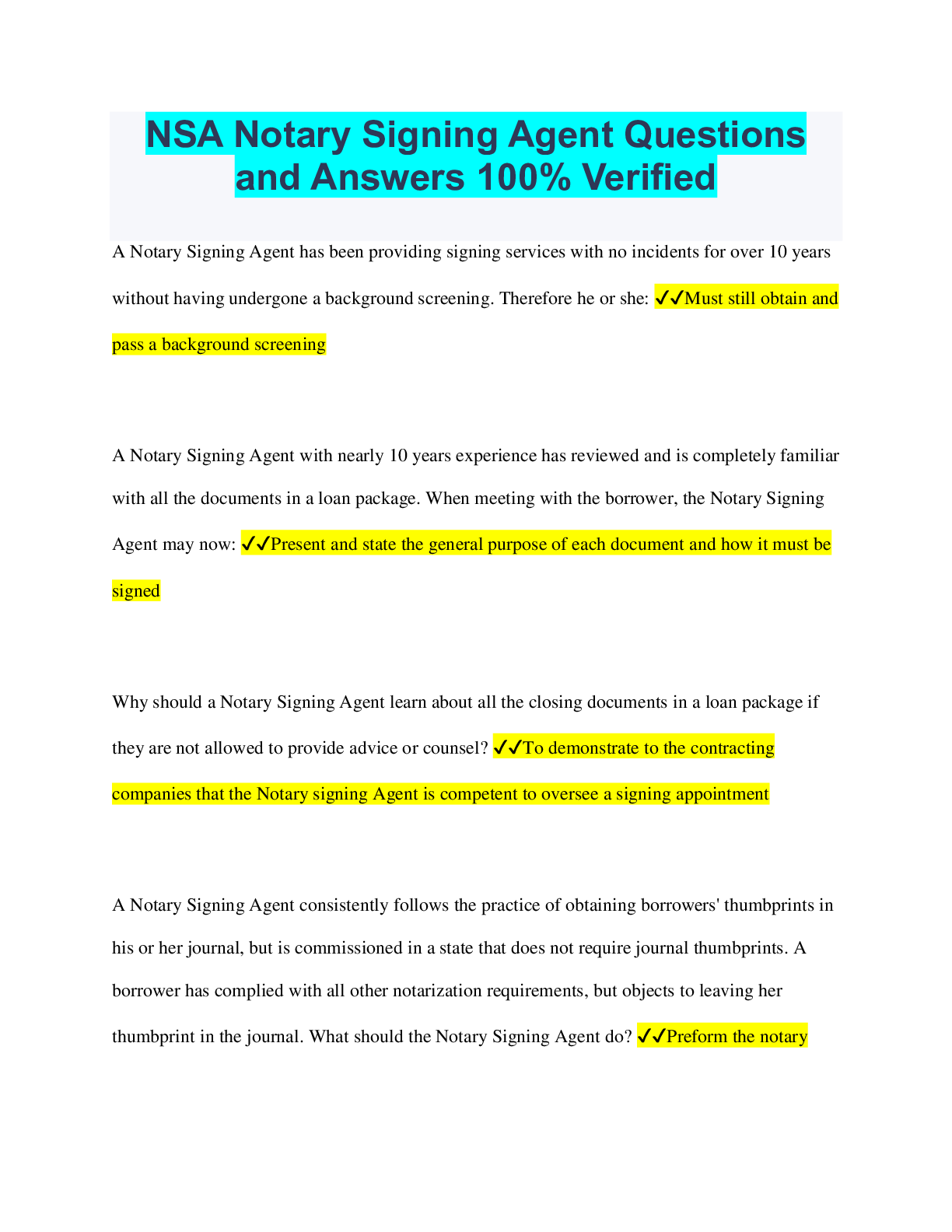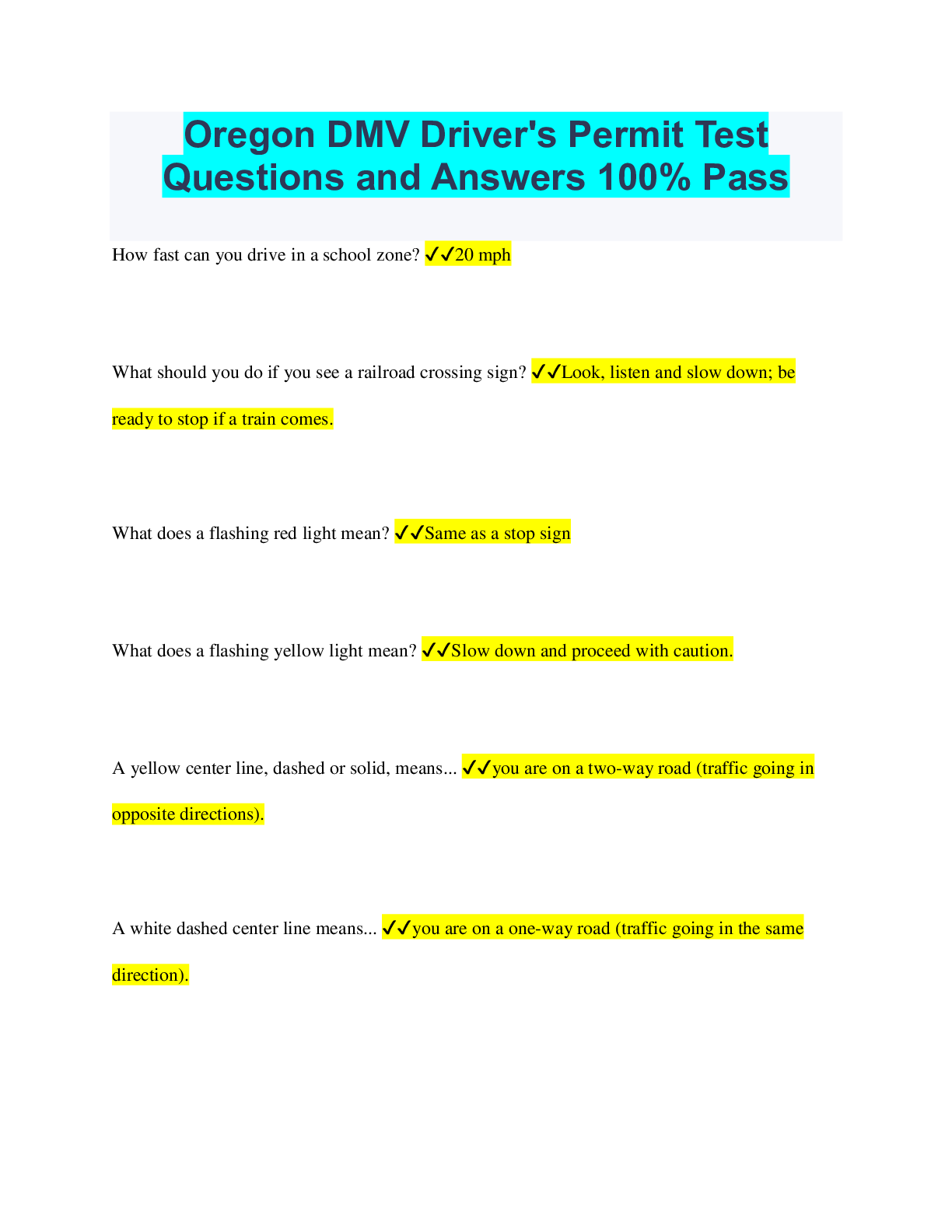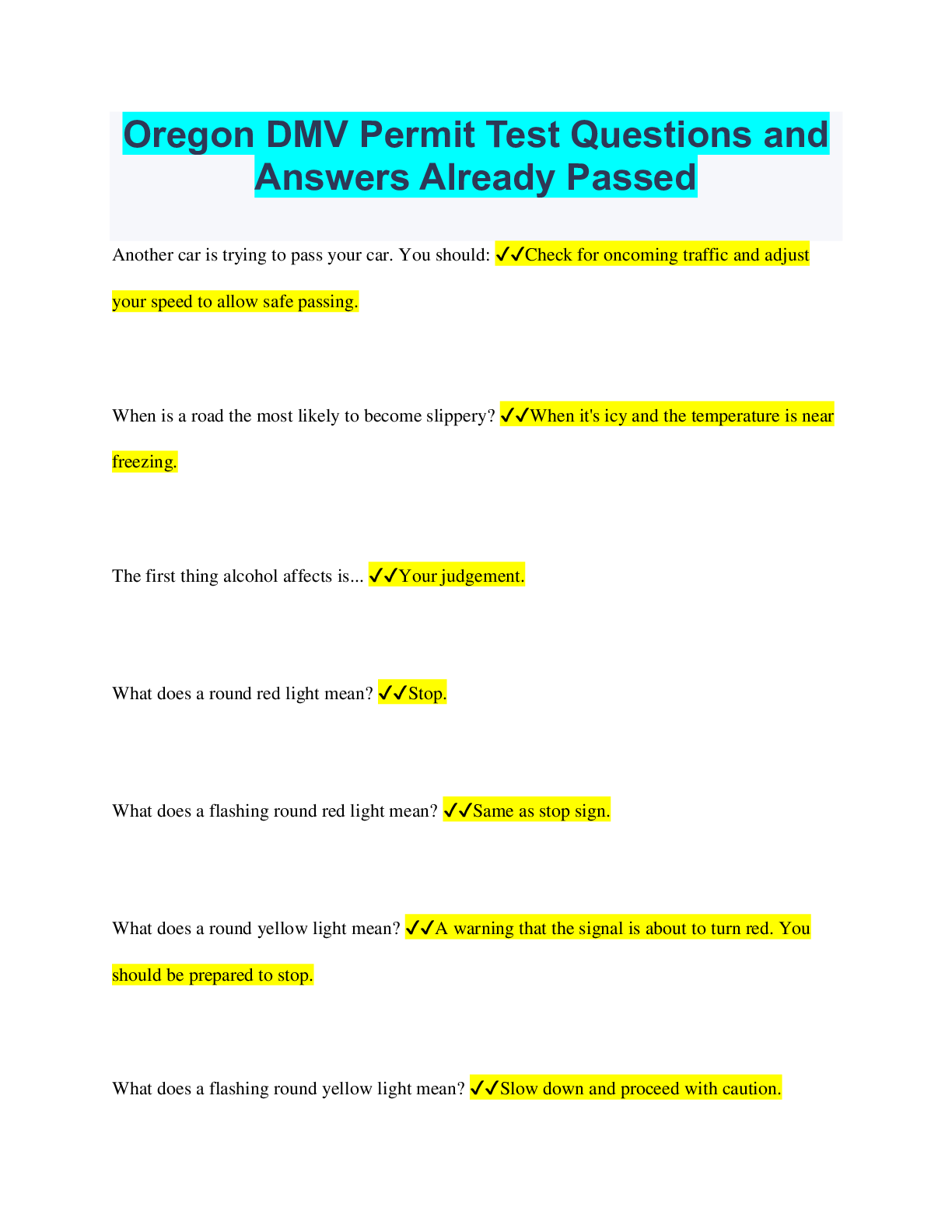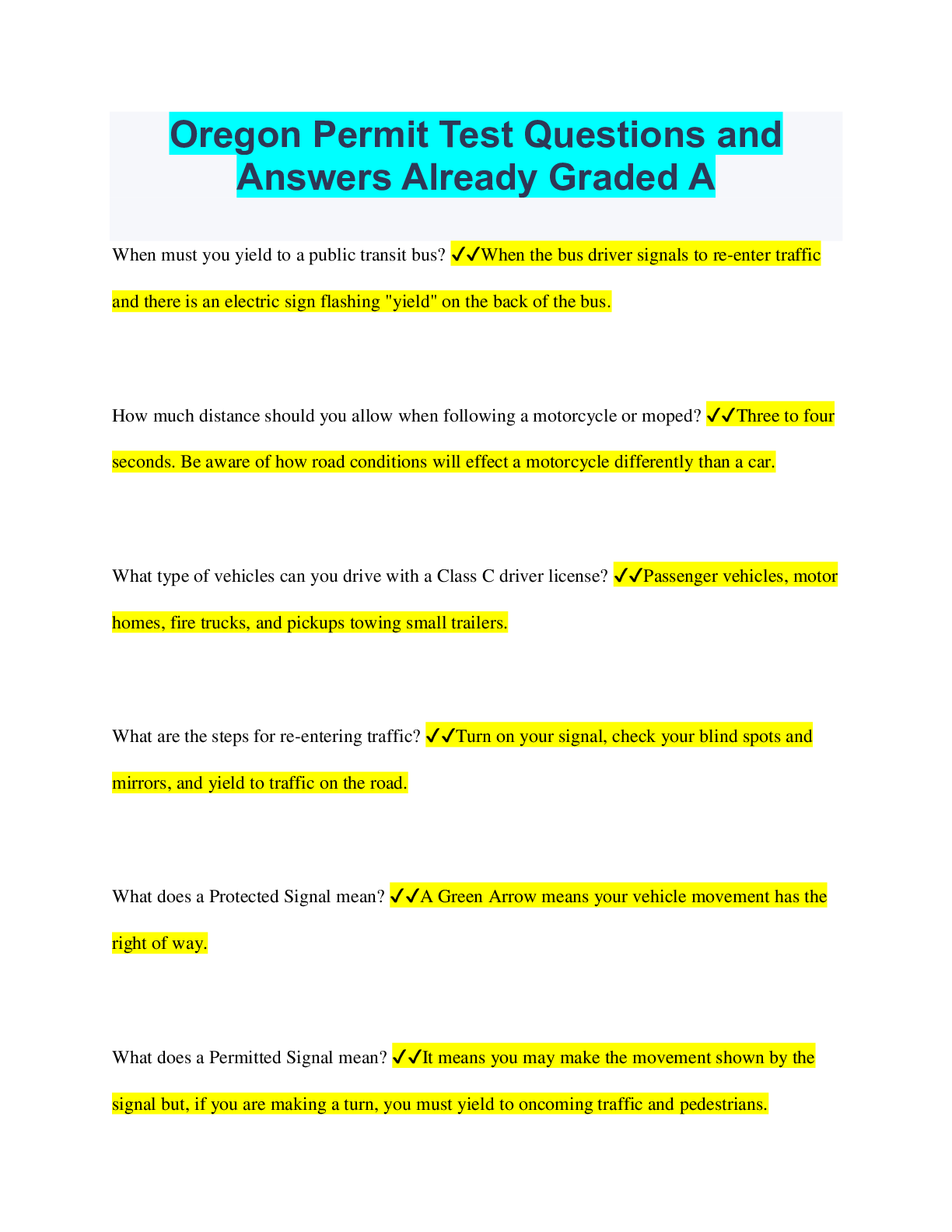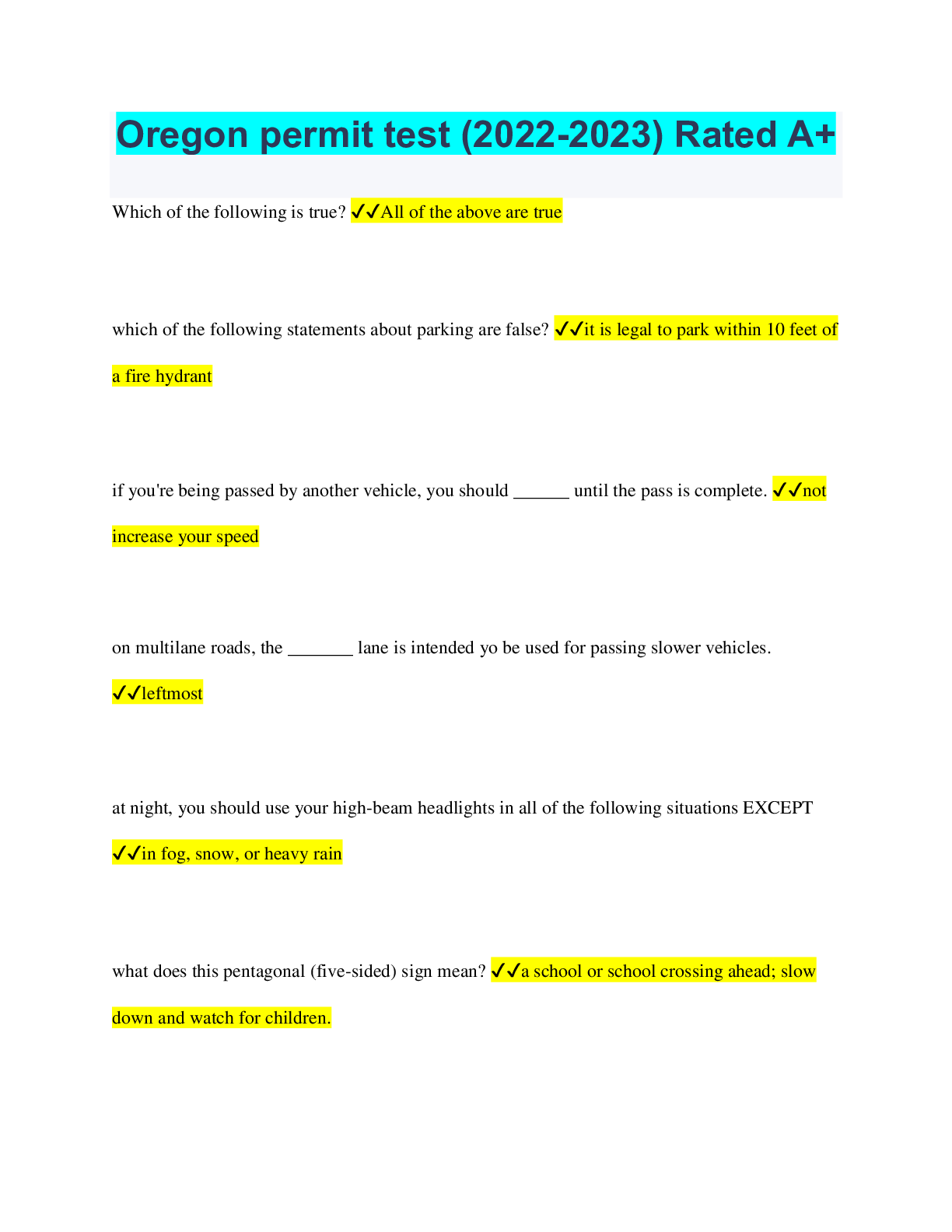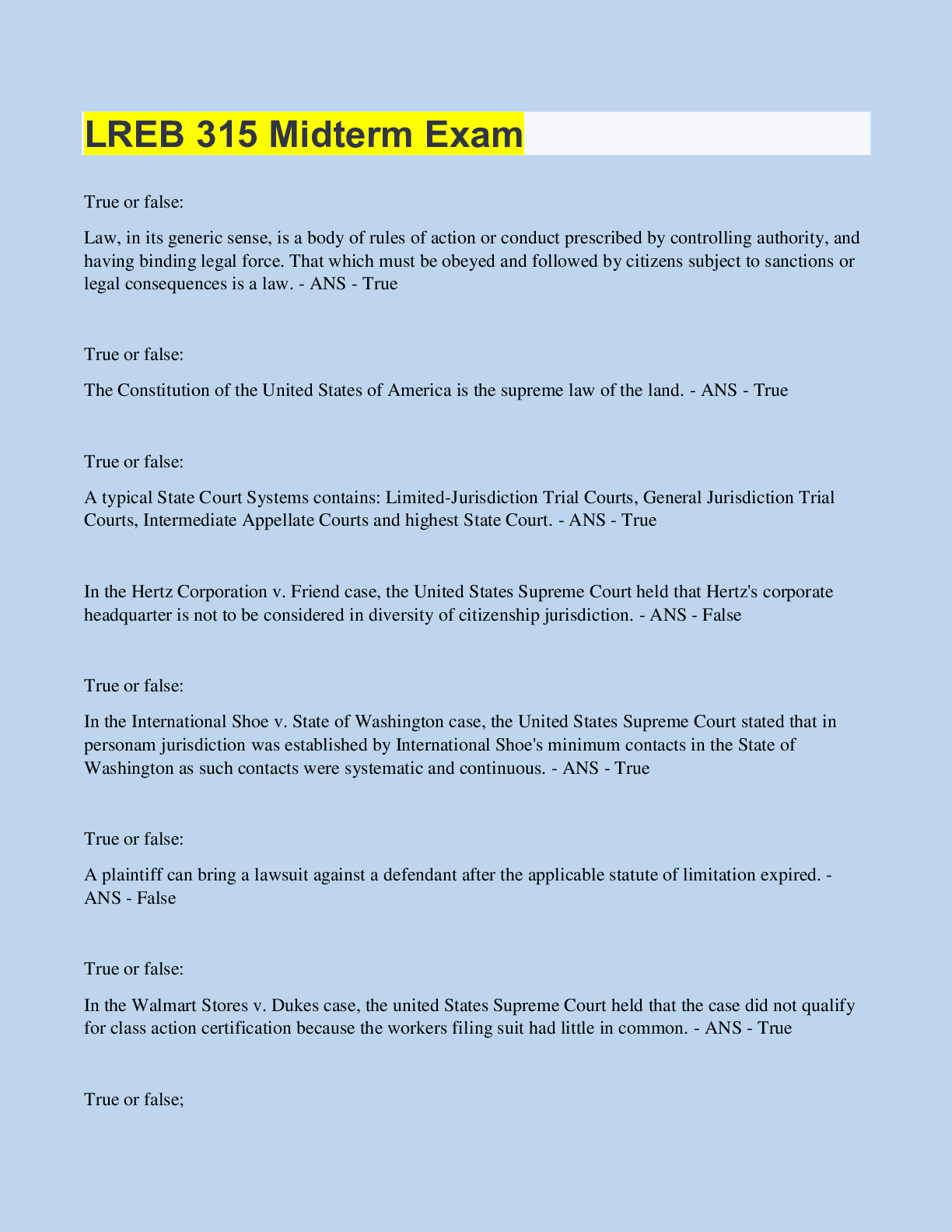Health Care > QUESTIONS & ANSWERS > Health & Wellness Coaching Exam Test Prep Practice Questions and Answers 100% Verified (All)
Health & Wellness Coaching Exam Test Prep Practice Questions and Answers 100% Verified
Document Content and Description Below
Health & Wellness Coaching Exam Test Prep Practice Questions and Answers 100% Verified Practice Question #1: Is the following goal a behavioral goal or an outcome goal? ______ I will lose 10 pound... s in two months. ✔✔Outcome goal is correct answer! Practice question #2: Which type of reflection is the following statement. "It's sounds like you are saying getting more sleep is important to you but you are not willing to give up video games at night." A. Simple reflection B. Amplified reflection C. Double-sided reflection ✔✔C is correct answer! Practice Question #3: Which of the following is true about brainstorming sessions? a. Brainstorming sessions last as long as they need to. b. Very specific answers c. No evaluation of quality of answers d. All of the above ✔✔C is correct answer! Practice Question #4: Turn the following statement into a simple reflection. Next, turn it into an amplified reflection. "I don't see the point of trying to get more fit. Everything I've tried never works" ✔✔Simple: I hear you say you've tried everything. Amplified: Nothing you will do will EVER work no matter what. Practice Question #5: Which of the following is not considered a major risk factor for cardiovascular disease? A. Physical inactivity B. Smoking C. Stress D. Alcohol-use ✔✔Correct answer is D Practice Question #6: Which of the following behavior change technique is considered most collaborative? A. Motivational Interviewing B. Health Education C. Prochaska's Stages of Change D. Cognitive Behavioral Therapy ✔✔A is correct answer Practice Question #7: At which coaching session is it best to set SMART goals? A. First session B. Second session C. 6th session D. After at least 2 months ✔✔A or B is correct. Most often the first session is for visioning and second session is goal setting but it can be done in first session too! Practice Question #8: The following description is a the definition of which term?"the feeling that you understand and share another person's experiences and emotions" A. Sympathy B. Empathy C. Rapport D. Coaching Relationship ✔✔B Practice Question #9: Which of the following is not one of the five principles of Appreciative Inquiry? A. Empathetic B. Positive C. Anticipatory D. Poetic ✔✔Answer is A Practice Question #10: A Registered Dietician just passed his RD exam and is now a NBCHWC. He holds no other certifications. He designed a HIIT program his first client. Is he operating within his ICHWC scope of practice? ✔✔Nope Practice Question #11: If you as the coach experience a traumatic life event that you feel will effect your ability to coach, per the ICF Standards of Ethical Conduct you should: A. Continue to coach and survey your client at the end to see how you performed B. Ask your client if they would be willing to take a break from coaching C. Suspend or terminate the coaching relationship and refer them to another coach ✔✔Answer is C Practice Question #12: If a coach promotes losing 20 pounds in one week after taking a supplement daily, the coach is violating: A. ICF Standards of Ethical Conduct B. ACSM Guidelines C. USDA Nutritional Guidelines ✔✔Answer is A Practice Question #13: During a coaching session as the coach you are finding yourself checking social media. You are most likely struggling with: A. Building rapport B. Coaching presence C. Empathy ✔✔Answer is B Practice Question #14: Prochaska, Norcross, & DiClemente recommend a nurturing parent style of coaching for those in which stage: A. Action B. Preparation C. Precontemplation ✔✔Answer is C Practice Question #15: The driver of a vision statement is one's: A. Beliefs B. Values C. Goals ✔✔Values is correct answer! Practice Question #16: Which of the following would NOT be included in a coaching agreement? A. Health History B. Description of Coaching Services C. No-show Policy D. Fee Schedule ✔✔Answer is A Practice Question #17: Which of the following best describes the righting reflex? A. Coach gives advice and offers solutions. B. Coach supports the client's right to choose which option they want. C. Coach follows the client's lead. ✔✔Answer is A Practice Question #18: _________ are statements of intended results spoken or written in the first person. A. Goals B. Reflections C. Missions D. Affirmations ✔✔The Answer is D. Practice Question #21: If a coach gets a client to begin advocating for their own change, this is called: A. Reframing B. Evoking C. Structuring D. Zooming ✔✔Answer is B Practice Question #22: Goal-setting theory includes four mechanisms for behavior change. Which of the following is not a mechanism of goal-setting theory? A. Directed attention B. Persistence C. Motivation D. Strategy ✔✔Answer is C Practice Question #24: When the interaction of skill and challenge are matched you are said to be experiencing____? A. Fulfillment B. Well-being C. Flow ✔✔Answer is C. Practice Question #25: If the client is largely resistant to change they are most likely in which stage of change? A. Precontemplation B. Contemplation C. Preparation D. Maintenance ✔✔Answer is A Practice Question #26: Which of the following is NOT a domain of emotional intelligence? A. Self-Awareness B. Self-Management C. Self-Fulfillment D. Social Awareness ✔✔C is correct Practice Question #27: Which of the following is an example of an unbiased question? A. Where might you start? B. Have you considered hiring a personal trainer? C. Can you set a goal to complete next week? D. Have you thought about keeping a food log? ✔✔Answer is A Practice Question #28: Which open-ended question would be best if your client is not ready to change at all? A. What would have to happen that would signal you that it's time to start thinking about changing? B. What would be some positive aspects of changing right now? C. What has worked for you in the past? D. What are some positive aspects of not changing right now? ✔✔The answer is A. So this is either a really tough question or I wrote it poorly. Let me explain my thinking so we can all learn and discuss. B and D are decisional balance questions and decisional balance activities are most appropriate for those in contemplation. Since this person is in precontemplation anything you can do to get them to recognize signs of change entering their lives is a step forward (question A). Question C would be for those that are already thinking or working toward change. Hope this helps! Practice Question #29: Self-disclosure on the part of the coach is often not advised. Which of the following reason would make self-disclosure appropriate? A. To let your client know you've experienced something similar B. To promote trust C. To give your client time to think D. To show sympathy ✔✔B is the answer. Practice Question #30: Coaches are sometimes called "guides on the side". This means: A. You provide only helpful suggestions. B. You are comfortable not knowing what is best for your client. C. You provide education at each session. ✔✔B is correct. Practice Question #31: In which situation would dialing 2-1-1 be important? A. In an emergency situation while coaching B. If your client is going through a high-stress situation at work C. Recognizing symptoms of depression in your client. ✔✔You may not actually call yourself but you would refer to resources on the 2-1-1 list if you noticed any signs/symptoms to document you have done the referral. Most people go above and beyond this and have people they know for referrals but at minimum the ethical expectation is usually at least a resource on your local 2- 1-1 resource. Answer is C. Took a little liberty with this one to get the word out. Practice Question #32: Which of the following is NOT an example of mindful listening? (Coaching Psychology Manual pg. 34) A. Pause after your client has spoken. B. Listen for only the facts. C. Do not interrupt (except if a client wanders off track) D. Mirror what the client has said to confirm your understanding. ✔✔B is the answer. Practice Question #33. Prochaska & Prochaska in their book Changing to Thrive (pg.12) indicate that the most significant jump from one stage of change to the next is between _______ and ________. A. Precontemplation ➡️ contemplation B. Contemplation ➡️ Preparation C. Preparation ➡️ Action D. Action ➡️ Maintenance ✔✔Answer is A Practice Question #34: (CDC reference provided in study guide for healthy lifestyles competencies). Your client tells you their provider told them they need to increase their HDL but he doesn't even know what that is. So, he asks you to explain it. Which description below best describes what HDL is? A. The total cholesterol level in the blood. B. The average level of sugar in the blood. C. The total amount of fat in the blood. D. The level of "good cholesterol" in the blood. ✔✔Answer is D Practice Question #35: Your client has had success in improving his stress management skills and resiliency. He is now focusing on his water consumption. Client: I remember for about 2 days and then get busy and forget to drink my water and then start all over agin. I've tried apps, different types of water bottles, and adding flavor. Nothing seems to work. Coach: That must be very frustrating. Which of the following skills is the coach most likely using? (ICHWC practice question reworked just for fun!) (A) Being patient (B) Bottom-lining (C) Eliciting motivation (D) Empathizing (E) Summarizing ✔✔D is the answer Practice Question #36: Coaching programs often teach that asking WHY questions are not ideal because it puts clients on the defensive (Arloski pg. 121). Please rewrite the question below to avoid using WHY. What is another way you can ask this question? "Why don't you just try to exercise?" ✔✔What are some ways that you have enjoyed movement in the past? Was there a time when you were successful with an exercise routine? Tell me about some activities you like to do for physical activity? Practice Question #37: You are on your second session with your client and she tells you she is not satisfied with her stress levels. It stresses her out just thinking about it. Her goals is to reduce her stress levels to increase her energy. Prior to this session, she took a strengths assessment. Her strengths included bravery, humor, and fairness. Her lowest categories in the strengths assessment were gratitude, prudence, and creativity. Which of the following is the most appropriate approach for this client? (Coaching Psychology Manual, pg. 50, 107). A. Encourage the client to explore her artistic side. B. Encourage the client to use a gratitude journal. C. Establish a schedule to set aside listening to the meditation app HeadSpace. D. Explore the client's strengths to find ways to meet her goals. ✔✔Answer is D Practice Question #38: Based on your client's health history she has been exercising regularly (biking) for three years maintaining 175 minutes per week. She indicated to you her new goal is to complete a triathlon and she has already started adding some running and swimming to her weekly routine. Which stage of change is the client most likely in as it pertains to her new goal of completing a triathlon? (Prochaska & Prochaska pp. 1-33) A. Maintenance B. Action C. Preparation D. Contemplation E. Precontemplation ✔✔Answer is B with her new goal of a triathlon she is taking action. Practice Question #39: Your client is going to be assessed for obesity at his next visit. The _____ measurement is most common and the ______ measurement is best for assessing visceral fat. (Health Harvard Link in Study Guide) A. Waist-to-hip; Skinfolds B. Skinfolds; BMI C. BMI; Waist-to-hip D. MRI; Skinfolds ✔✔Answer is C Practice Question #40: A coach sees his client in the grocery store with what appears to be her mother standing next to her. He approaches his client and tells her what a great job she has been doing with her weight loss and smoking cessation. According to the ICHWC Code of Ethics, which of the following ethical principles is most likely being violated by this coach's actions? (A) Confidentiality (B) Conflict of interest (C) Consent (D) Professional boundaries (E) Scope of practice ✔✔Answer is A Practice Question #43: Describe the MAJOR differences between the CDC's MyPlate and Harvard's Healthy Eating Plate (ICHWC Guidelines for Exam page 30). ✔✔Harvard's Healthy Eating has more veggies, less fruit, healthy oils, no dairy, water, equal amounts of WHOLE grains and proteins Practice Question #44: Client: I don't have time to prep healthy food for lunch or dinner and neither does anyone in my family! Coach: Since you don't have time to good prep, let's talk about the smoothies you said you were drinking 3 times a week and loving them. Which reflective listening skill is the coach using? (WellCoaches manual page 68) A. Simple Reflection B. Shifted-Focus Reflection C. Amplified Reflection ✔✔Answer is B ahhh, too easy Practice Question #45: A Coach and Client are working on goal-setting. The Coach asks the question: "Is this goal within your capabilities?" and "Does this goal depend on anyone else's choices?" Which of the letters in the SMART acronym is the coach trying to clarify? A. Specific B. Measurable C. Attainable D. Relevant E. Time-Specific ✔✔Answer is C Practice Question #50: Client: I know that if I got a gym membership I would definelty increase my physical activity but I am so worried about looking dumb or getting injured. Which stage of change is this client most likely in? (Prochaska, Page 15). A. Precontemplation B. Contemplation C. Preparation D. Never gonna do it. ✔✔Answer is B [Show More]
Last updated: 2 years ago
Preview 1 out of 17 pages
.png)
Buy this document to get the full access instantly
Instant Download Access after purchase
Buy NowInstant download
We Accept:

Also available in bundle (1)
.png)
NBHWC Bundled Exams Questions and Answers with Certified Solutions
NBHWC Bundled Exams Questions and Answers with Certified Solutions
By Nutmegs 2 years ago
$20
15
Reviews( 0 )
$10.00
Can't find what you want? Try our AI powered Search
Document information
Connected school, study & course
About the document
Uploaded On
Feb 28, 2023
Number of pages
17
Written in
Additional information
This document has been written for:
Uploaded
Feb 28, 2023
Downloads
0
Views
106

.png)

